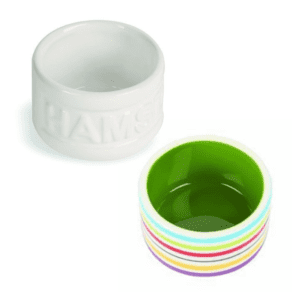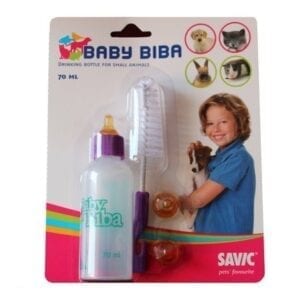Description
Beaphar Small Animal Milk is a complete milk replacement feed for newborn and orphaned rabbits, guinea pigs, chinchillas, mice, rats, gerbils, hamsters, degus, and hedgehogs weighing more than 50g.
Beaphar Small Animal Milk has been specially formulated to ensure low lactose levels of just 1.1% and a high fat content to closely resemble their mother’s natural milk. The recipe contains high-quality, easily digestible proteins, and added vitamins, minerals and trace elements, including Vitamin C, iron, zinc and calcium, to support optimum growth and development.
Beaphar Small Animal Milk can also be used for weaning small animals, or as a conditioning food for pregnant, lactating, sick or convalescing animals.
How to use
ALWAYS FULLY READ THE PRODUCT LABEL AND LEAFLET BEFORE USE.
When hand-rearing orphaned animals it is recommended to seek veterinary advice as soon as possible to discuss any necessary medical care, such as administration of an electrolyte solution. It is impossible to give precise daily quantities for feeds due to variations in the species of animal, age, size and breed. However, our suggested daily guidelines are given below. It is important to weigh young animals daily so that you can monitor their growth increase.
Use the table below for approximate feeding guidelines.
Using the scoop provided, add Beaphar Small Animal Milk to warm water (allow boiled water to cool before use) and stir until completely dissolved. If required, allow to cool further until lukewarm (38°C or blood temperature). The use of proper feeding equipment is highly recommended, such as the Beaphar Feeding Set or Beaphar Feeding Syringes. These should always be clean and sterile.
Prepared Beaphar Small Animal Milk can be refrigerated for 24 hours but should be reheated to 35–38°C or blood temperature before feeding to young animals.
Rabbits
When your rabbit is 15 days old, or approximately if the age is unknown, you can slowly change to a more solid diet.
Dilution: Using the spoon provided, add 9g (2 level spoons) to 15ml of warm water.
Weight Volume per meal Number of feeds per 24 hours
50–90g 2–5.5ml 3
90–300g 7–15ml 2
>300g 15–17ml 1
Guinea pigs
When your guinea pig is 2 days old, or approximately if the age is unknown, you can slowly change to a more solid diet.
Dilution: Using the spoon provided, add 4.5g (1 level spoon) to 20ml of warm water.
Weight Volume per meal Number of feeds per 24 hours
60–120g 1–2ml 11 (9 during daylight hours and 2 overnight)
120–180g 2–3ml 6–7 (6 during daylight hours and 1 overnight)
180–240g 3–4ml 6–7 (during daylight hours)
240–300g 4–5ml 6 (during daylight hours)
Hedgehogs
When your hedgehog is 20 days old, or approximately if the age is unknown, you can slowly change to a more solid diet.
Dilution: Using the spoon provided, add 9g (2 level spoons) to 20ml of warm water.
Weight Volume per meal Number of feeds per 24 hours
50–60g 1–2ml 8–12
60–90g 3ml 6
>90g 3ml 3–4
Gerbils
When your gerbil is 21 days old, or approximately if the age is unknown, you can slowly change to a more solid diet.
Dilution: Using the spoon provided, add 9g (2 level spoons) to 15ml of warm water.
Weight Volume per meal Number of feeds per 24 hours
2.5–5g 1ml 12
5–15g 2ml 8
15–25g 3ml 6–8
Hamsters
When your hamster is 28 days old, or approximately if the age is unknown, you can slowly change to a more solid diet.
Dilution: Using the spoon provided, add 9g (2 level spoons) to 15ml of warm water.
Weight Volume per meal Number of feeds per 24 hours
3–15g 2–3 drops 24
15–35g 0.5ml 12
>35g 1ml 12
Degus
When your degu is 14 days old, or approximately if the age is unknown, you can slowly change to a more solid diet.
Dilution: Using the spoon provided, add 4.5g (1 level spoon) to 20ml of warm water.
Weight Volume per meal Number of feeds per 24 hours
8–30g 1ml 12
30–45g 1–2ml 8
45–115g 3–4ml 3–4
115–260g 5–8ml 1–2
Chinchillas
When your chinchilla is 21 days old, or approximately if the age is unknown, you can slowly change to a more solid diet.
Dilution: Using the spoon provided, add 9g (2 level spoons) to 20ml of warm water.
Weight Volume per meal Number of feeds per 24 hours
40–60g 1ml 11 (9 during daylight hours and 2 overnight)
60–70g 1–2ml 8 (7 during daylight hours and 1 overnight)
70–120g 2–3ml 5 (4 during daylight hours and 1 overnight)
>120g 3ml 4 (during daylight hours)
Mice
When your mouse is 12 days old, or approximately if the age is unknown, you can slowly change to a more solid diet.
Dilution: Using the spoon provided, add 9g (2 level spoons) to 15ml of warm water.
Weight Volume per meal Number of feeds per 24 hours
0.5–5g 1–5 drops 7 (6 during daylight hours and 1 overnight)
5–10g 0.25ml 6 (5 during daylight hours and 1 overnight)
10–15g 0.5ml 3–4 (during daylight hours)
15–30g 1–1.5ml 2 (during daylight hours)
Rats
When your rat is 14 days old, or approximately if the age is unknown, you can slowly change to a more solid diet.
Dilution: Using the spoon provided, add 9g (2 level spoons) to 20ml of warm water.
Weight Volume per meal Number of feeds per 24 hours
10–20g 1ml 7 (6 during daylight hours and 1 overnight)
20–40g 1–2ml 6 (5 during daylight hours and 1 overnight)
40–80g 3–4ml 3–4 (during daylight hours)
80–200g 5–8ml 2 (during daylight hours)





Reviews
There are no reviews yet.